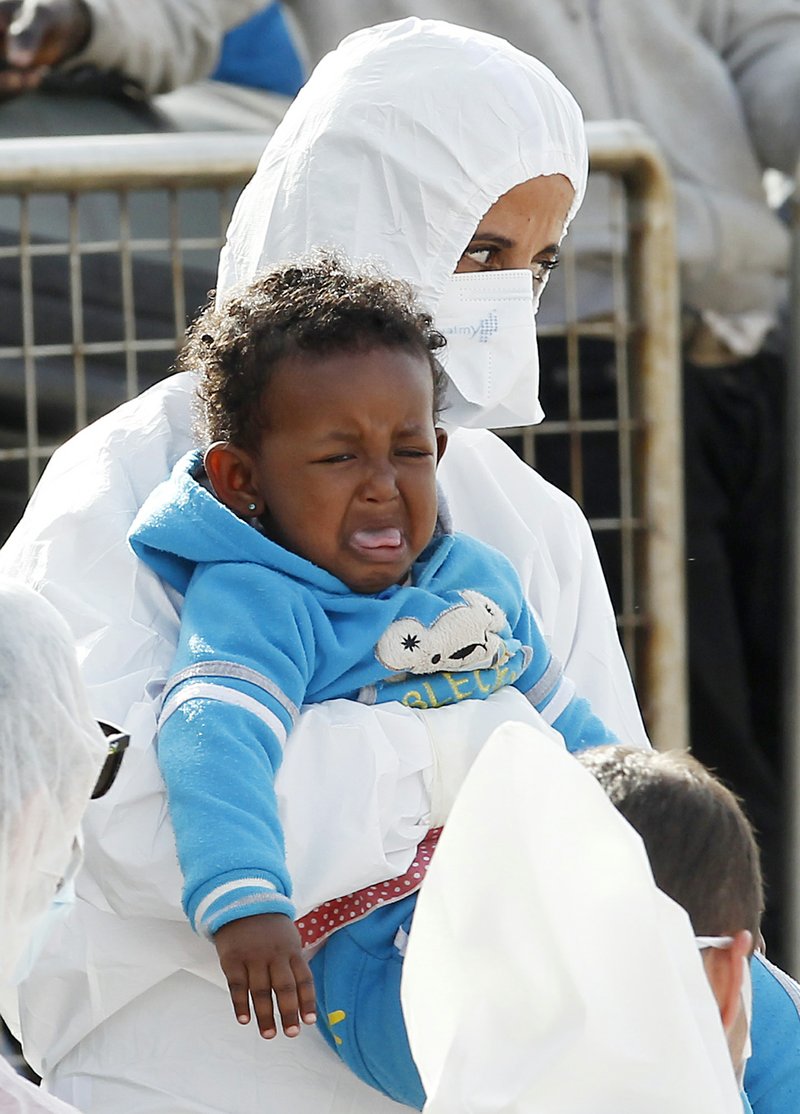CATANIA, Sicily -- Nearly 100 people who reported being at sea for 12 days arrived Wednesday in Sicily, as diplomats considered a draft United Nations resolution authorizing a European Union mission to seize the smugglers' boats that are fueling a trafficking crisis in the Mediterranean.
The 98 people, a third of them women and three of them pregnant, were among hundreds of foreigners who arrived in Italian ports Wednesday after being rescued from overcrowded dinghies and fishing boats in recent days. Most have set off from Libya, where human traffickers charging people about $1,000 apiece are operating with near-impunity in the country's political chaos.
The EU's foreign-policy chief, Federica Mogherini, is to brief the Security Council on Monday about the crisis and about EU proposals to target the traffickers. A draft U.N. resolution would authorize an EU mission for one year to seize boats where there's credible evidence that they're being used by smugglers, a council diplomat said Wednesday in New York.
The resolution, which would be militarily enforceable, would cover the high seas, Libya's territorial waters and coast, and mission members also could go on land.
Some EU leaders had proposed a U.N.-blessed operation to destroy smugglers' boats before they are used. But the idea has raised legal concerns, and Russia -- which has veto power at the Security Council -- has said it would oppose any ship-destroying resolution.
"Apprehending human traffickers and actually arresting those vessels is one thing, but destroying them would be going too far," said Russia's ambassador to the EU, Vladimir Chizhov.
However, Russia reportedly supports the draft resolution calling for the ships to be seized, said the council diplomat, who spoke on condition of anonymity because he wasn't authorized to provide details of the negotiations.
The diplomat stressed that the resolution, which is expected to be approved before a May 18 EU foreign ministers' meeting, is aimed at reducing the suffering of those trying to cross the sea to reach Europe, even though provisions to address their needs are still being worked out.
Libya probably will need to give the mission permission for any actions in its waters or on its shores -- something that would be complicated because the North African nation has two rival governments.
The head of the Italian Red Cross, Francesco Rocca, met with the U.N. chief Wednesday in New York and concurred that bombing smugglers' ships wasn't the answer.
He said a political solution must be found to resolve the chaos in Libya, and then a humanitarian approach found to cope with the people there who hope to flee to Europe through the country.
"There are hundreds of thousands in Libya at the moment," he said. "Who will protect them?"
He said U.N. Secretary-General Ban Ki-moon would be returning to Europe in the coming weeks to push the EU for a "humanitarian imperative" at the root of its response to the crisis.
Even as diplomats debated how best to cope, the boats kept heading out to sea.
Two coast guard rescue boats took 650 people ashore in Roccella Ionica, an Italian port in the southern Calabria region, while an equal number arrived in Naples. Hundreds more were taken ashore in rescue boats to the Italian cities of La Spezia, Taranto, Messina and elsewhere.
The Italian border patrol ship Monte Cimone arrived in Catania late Wednesday carrying 98 passengers who reported having been at sea for 12 days before being rescued. Two women were taken off on stretchers and were followed by three young children and several teenagers. The people told Italian officials that they had spent the past two days adrift 125 miles off Sicily, without food or water and with the ship's hold flooding.
In Libya, a top coast guard official, Gen. Ayoub Ghasem, said more than 700 people were caught before leaving Libya's territorial waters Monday and Tuesday.
Libya sends such people to detention centers, but many bribe the militiamen guarding the prisons to get out, officials have said.
"We have very limited resources," Ghasem said. "Europe wants Libya to be its policeman, not a real partner. That is the problem."
Information for this article was contributed by Lorne Cook, Raf Casert and Maggie Michael of The Associated Press.
A Section on 05/07/2015


